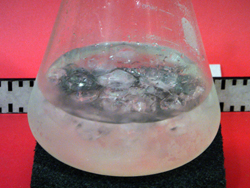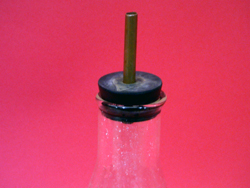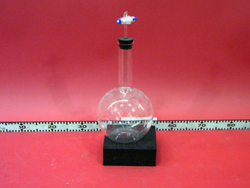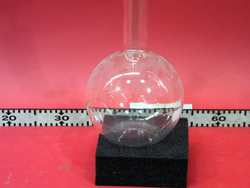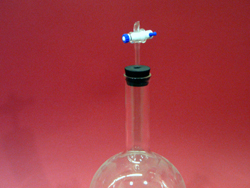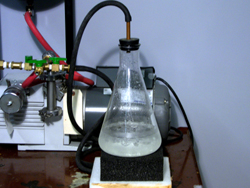|
Size: 1887
Comment:
|
← Revision 7 as of 2013-07-12 18:17:55 ⇥
Size: 3269
Comment: converted to 1.6 markup
|
| Deletions are marked like this. | Additions are marked like this. |
| Line 2: | Line 2: |
| ||<:30%>[:PiraScheme#Thermodynamics: Table of Thermodynamics Demonstration]||<:30%>[:TDEquipmentList: Thermodynamics Equipment List]||<:30%>[:Demonstrations:Lecture Demonstrations]|| | ||<:30%>[[PiraScheme#Thermodynamics| Table of Thermodynamics Demonstration]]||<:30%>[[TDEquipmentList| Thermodynamics Equipment List]]||<:30%>[[Demonstrations|Lecture Demonstrations]]|| |
| Line 7: | Line 7: |
| Change of State, [:ChangeofState#CriticalPoint: 4C50. Critical Point] | Change of State, [[ChangeofState#CriticalPoint| 4C50. Critical Point]] |
| Line 10: | Line 10: |
| * '''Cabinet:''' [:ThermoCabinet:Thermodynamics (TD)] * '''Bay:''' [:ThermoCabinetBayA5:(A5)] |
* '''Cabinet:''' [[ThermoCabinet|Thermodynamics (TD)]] * '''Bay:''' [[ThermoCabinetBayA5|(A5)]] |
| Line 14: | Line 14: |
| attachment:TripplePointWater07-400.jpg | {{attachment:TripplePointWater07-400.jpg}} |
| Line 18: | Line 18: |
| Insert succinct description of demonstration. | A sealed Erlenmeyer flask filled with ice water has the air pumped out of it creating a partial vacuum. Thus brings the mixture to the triple point of water whereupon the mixture boils showing solid, liquid, and gas existing at the same pressure and temperature. |
| Line 22: | Line 22: |
| ||Erlenmeyer Flask with Holed Stopper||[:ThermoCabinetBayA5: TD, Bay A5, Shelf #2]|| || ||Vacuum Pump with Air Hose||[:MechanicsCabinet#MEFloorItems: Floor item South Wall (ME)]|| || |
||Erlenmeyer Flask with Holed Stopper||[[ThermoCabinetBayA5| TD, Bay A5, Shelf #2]]|| || ||[[VacuumPump| Vacuum Pump]]||[[MechanicsCabinet#MEFloorItems| Floor item South Wall (ME)]]|| || |
| Line 28: | Line 28: |
| * N/A | * '''''Ice is needed of this demonstration, witch may require extra setup time.''''' |
| Line 33: | Line 33: |
| 1. List steps for setup then procedure. 1. ... |
1. Pull out and plug in the Vacuum Pump cart. See [[VacuumPump| Vacuum Pump]] page for operational instructions. 1. Add about an inch worth of ice to either flask. 1. Add just enough water to the flask to cover the ice. 1. Firmly push on the stopper with the vent tube to seal the flask. 1. Place the vacuum hose onto the vent tube. 1. Turn on the vacuum pump. |
| Line 42: | Line 46: |
| Discuss the physics behind the demonstration, explaining some of the various steps of the demonstration when appropriate. | {{attachment:h2o_phase_diagram_-_color.v2-400.jpg}} |
| Line 44: | Line 48: |
| ||attachment:TripplePointWater01-250.jpg||attachment:TripplePointWater02-250.jpg||attachment:TripplePointWater03-250.jpg||attachment:TripplePointWater04-250.jpg|| ||attachment:TripplePointWater05-250.jpg||attachment:TripplePointWater06-250.jpg||attachment:TripplePointWater08-250.jpg|| |
Matter exists in different phases depending upon its pressure and temperature. The specifics depend on which substance we're considering. The combinations of temperature and pressure that lead to a given phase of matter can be summarized in a phase diagram. Such a diagram for water is shown above. There exists one particular combination of temperature and pressure that allows water to exist as a solid, liquid, and gas simultaneously. This is called the triple point and for water this pressure and temperature are 612 Pa and 0°C. Adding ice to the water brings the ice water mixture into a dual phase state at 0°C. Using the vacuum pump, we pump out air from the flask which causes the internal pressure to drop. Upon reaching a pressure of 612 Pa, we see the ice water boil. ||{{attachment:TripplePointWater01-250.jpg}}||{{attachment:TripplePointWater02-250.jpg}}||{{attachment:TripplePointWater03-250.jpg}}||{{attachment:TripplePointWater04-250.jpg}}|| ||{{attachment:TripplePointWater05-250.jpg}}||{{attachment:TripplePointWater06-250.jpg}}||{{attachment:TripplePointWater08-250.jpg}}|| |
| Line 48: | Line 54: |
| * [https://www.youtube.com/user/LectureDemostrations/videos?view=1 Lecture Demonstration's Youtube Channel] | * [[https://www.youtube.com/user/LectureDemostrations/videos?view=1|Lecture Demonstration's Youtube Channel]] |
| Line 52: | Line 58: |
| * [https://en.wikipedia.org/wiki/Tripple_point Wikipedia - Triple Point] | * [[https://en.wikipedia.org/wiki/Tripple_point|Wikipedia - Triple Point]] |
| Line 55: | Line 61: |
| [:Instructional:Home] | [[Instructional|Home]] |
Triple Point of Water, 4C50.40
Topic and Concept:
Change of State, 4C50. Critical Point
Location:
Cabinet: Thermodynamics (TD)
Bay: (A5)
Shelf: #2
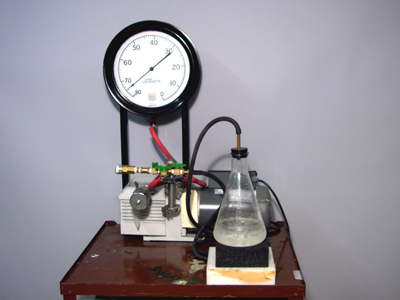
Abstract:
A sealed Erlenmeyer flask filled with ice water has the air pumped out of it creating a partial vacuum. Thus brings the mixture to the triple point of water whereupon the mixture boils showing solid, liquid, and gas existing at the same pressure and temperature.
Equipment |
Location |
ID Number |
|
|
|
Erlenmeyer Flask with Holed Stopper |
|
|
|
||
Ice |
Lecture demo Freezer or 4rd floor ice chess room4329 |
|
Important Setup Notes:
Ice is needed of this demonstration, witch may require extra setup time.
Setup and Procedure:
Pull out and plug in the Vacuum Pump cart. See Vacuum Pump page for operational instructions.
- Add about an inch worth of ice to either flask.
- Add just enough water to the flask to cover the ice.
- Firmly push on the stopper with the vent tube to seal the flask.
- Place the vacuum hose onto the vent tube.
- Turn on the vacuum pump.
Cautions, Warnings, or Safety Concerns:
- N/A
Discussion:

Matter exists in different phases depending upon its pressure and temperature. The specifics depend on which substance we're considering. The combinations of temperature and pressure that lead to a given phase of matter can be summarized in a phase diagram. Such a diagram for water is shown above. There exists one particular combination of temperature and pressure that allows water to exist as a solid, liquid, and gas simultaneously. This is called the triple point and for water this pressure and temperature are 612 Pa and 0°C. Adding ice to the water brings the ice water mixture into a dual phase state at 0°C. Using the vacuum pump, we pump out air from the flask which causes the internal pressure to drop. Upon reaching a pressure of 612 Pa, we see the ice water boil.
|
|
|
|
|
|
|
Videos:
References:

